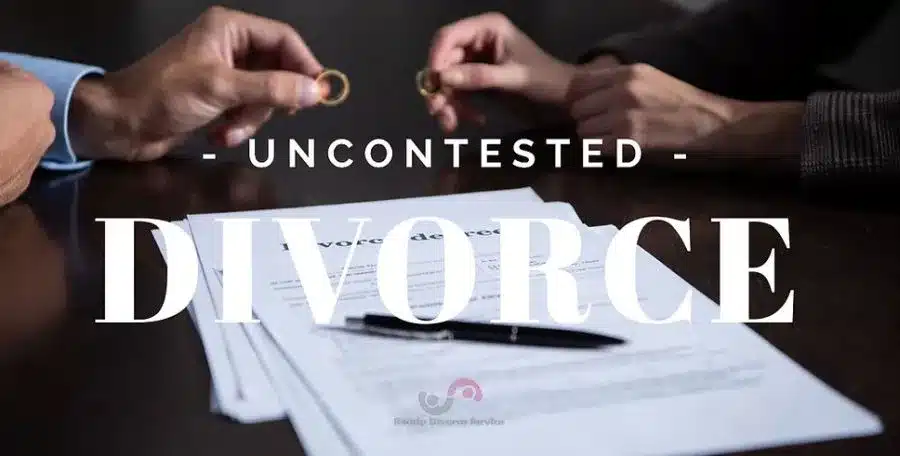A Guide to Texas Divorce Laws
In Texas, the rules about marriage and divorce are important if you’re thinking about getting a divorce. Here’s what you need to know in simpler terms:
- When you’re married, you and your spouse own everything together. This is because Texas considers all the things you get while married as shared property, though there are a few exceptions to this rule.
- You don’t need a specific reason for getting a divorce in Texas. You can simply say the marriage isn’t working and can’t be fixed.
- Although, if you prefer, you can give one of seven specific reasons for ending the marriage.
- If one spouse wants a divorce, they can start the process without the other’s agreement. The other spouse cannot stop the divorce from happening just because they want to stay married.
These rules will affect how your things are split up, who the children will live with, the support for the children, and payments one spouse might have to make to the other after divorce.
Here are some of the most common legal questions and major issues you should know about that come up during a divorce in Texas:
Property Issues • Alimony and Child Support • Custody and Visitation • Divorce Process • Other Divorce Issues
How is the division of property handled in a Texas divorce?
Community Property in Texas
In Texas, when you’re married, most of the things you get while married are owned by both you and your spouse. This includes things like houses, cars, and money. There are some items, however, that only belong to one person, even if they got them while they were married. These are things like:
- Something you inherit;
- Gifts given just to you;
- Money you get for being hurt, if it’s meant just for you.
Also, if you owned something before getting married or you got it after you and your spouse decided to live separately, it remains only yours.
When a married couple decides to go their separate ways, the rules say that everything owned together should be split fairly. What is fair can depend on different things, like how much money each person can earn, who will be taking care of any children, each person’s health, education, and so on.
If you have something that you want to keep as your own and not share with your spouse, it’s important to keep it separate. For example, don’t put it in a shared bank account or put your spouse’s name on it. When you start mixing your individual items with shared items, it can get tricky to figure out who owns what later on.
If you and your spouse can’t agree on who owns certain items, especially if they have been mixed together, you might need a lawyer who knows a lot about family laws to help you sort it out. This topic can get complicated, and professional help could be necessary.
How are debts divided?
In Texas, when you’re married, any debt you or your spouse get while married is typically shared by both of you.
Sometimes, when you’re deciding who gets what after a marriage ends, one person might agree to pay off more of a certain debt. In return, they might get to keep a larger part of something else, like the house or money saved for retirement.
But there are times when a debt might be in just one person’s name. For example, if only one spouse has a credit card and buys things just for themselves with it, they may be the only one who has to pay back that debt.
In cases where there is excessive debt above and beyond a couple’s community assets, courts may assign a greater portion of the debts to the spouse who is in better financial condition to pay off the debts.
Debts that are incurred after marriage or separation, or before marriage or separation only belong to the spouse who incurred them.
Division of Assets in Texas

As a community property state, the courts will divide marital assets in way that is considered “just and right” taking into consideration the rights of each spouse and any children in the marriage.
Community property is any property that is acquired during a marriage. Separate property is that which is acquired either before or after a marriage, with some notable exceptions. Property during a marriage that was acquired through an inheritance, as a gift or as a personal injury settlement for one spouse may also be considered separate property as well.
When you mix together personal belongings with things owned by both partners, it can get confusing. For instance, if you inherit some money and put it in a shared bank account, it might be treated as owned by both you and your spouse. The same thing can happen with a gift that both of you use together.
When dividing assets, the courts have the discretion of taking into account the age, health, earning power and other circumstances when trying to decide a just and right division of assets.
Things are not always split 50-50 right down the middle. This is where many disagreements can and do take place. Oftentimes, lawyers must be retained to negotiate a reasonable settlement among the parties.
See our Top 10 FAQs in Texas and Can a Divorce Affect Your Immigration Status in Texas?
How are gifts and inheritances handled in a Texas divorce?
Gifts
When one person in a marriage gets a gift, it usually just belongs to them, not to both spouses. This stays the same whether the gift came from the other person in the marriage or someone else.
But sometimes there can be confusion, especially if both spouses use the gift. For instance, if one spouse gets a car from the other, and they both use it, one might argue that the car belongs to both of them.
To keep things clear, it’s a good idea to write down details about the gift when you get it. This should include a note about who owns it, just in case there are any questions later on. If you’re about to get divorced, look for any papers that prove whether the gift was just for you or meant for both of you.
Inherited Property
In Texas, inheritances are viewed as separate property in a marriage. Disputes can arise when determining if an asset is separate or community property, especially if a will includes both the inheritor and their family. The inheritor might need to prove the asset was meant solely for them. Additionally, separate property may become community property if it’s mixed with marital assets, such as depositing inherited money into a joint account or if both spouses live in an inherited home.
At all times, it is best to keep inherited assets separate if there is a possibility of divorce that looms in the future.
One other way to protect an inheritance is to have your spouse sign a postnuptial agreement whereby he or she agrees that the inheritance is yours, no matter how it is used in the marriage.
How do retirement plans and pensions get divided in a divorce?
When a couple gets a divorce, things like pensions, IRAs, 401Ks, and retirement plans have to be split just like anything else they own together. These are considered shared property and must be divided fairly.
Often, because pensions can be worth a lot of money, they are used in negotiations. For instance, if a couple owns a house that has increased in value, one person might let go of their share in the pensions or retirement savings so they can keep the house.
Legally splitting pensions and other retirement funds are a multiple-step process. First, a divorce decree must order that these assets be divided. From this, a qualified domestic relations order, more commonly referred to as a QDRO will be created.
The QDRO must be approved by the courts and then it can be submitted to the plan administrator of each pension account who must also approve it. This establishes that your spouse can be considered an alternate payee, and the retirement vehicle is then divided according to the specifics contained in the QDRO.
What is treated as separate property in Texas?
Because Texas is a community property state, all assets acquired during the marriage are presumed to be owned equally by both spouses. However, Texas law also allows that certain property may be considered a separate property under some circumstances. Those instances include:
- Property that was owned by one spouse before the marriage
- Property that was given to one spouse as a gift or inheritance
- Awards from certain kinds of personal injury settlements that took place even while a couple was married
There are complexities when it comes to separate property. Any inheritance acquired during a marriage is considered separate property but if the assets of the inheritance are commingled, perhaps in a bank account, or if both people live in an inherited residence, then it may be possible to claim that the inherited assets have become community property.
In cases where a home was bought before two people married, if both people live in the home during the marriage and both contribute to mortgage payments, then the case can be made that the house is no longer separate property, but community property instead.
To avoid disagreements over what is community vs. separate property, spouses might enter into pre- or postnuptial agreements that specify which form of property an asset will be.
The issues of community property vs. separate property can become quite complicated and oftentimes require the assistance of an experienced family law lawyer to sort out ownership and make a spouse’s best case in front of the courts.
Alimony and Child Support

Alimony Laws: How Spousal Maintenance Works in Texas
In Texas, there are two kinds of payments one ex-spouse might make to another after they get divorced, which help support the ex-spouse. These are called “court ordered spousal maintenance” and “contractual alimony.” They are different in a few ways, like how much money is involved, how long the payments last, the way one gets the payments, and the rules for changing or making sure they are paid. These payments are separate from money given for the care of children, known as child support.
Court ordered spousal maintenance is when a judge decides during the divorce process that one ex-spouse must pay the other. This isn’t a choice; the judge orders it.
Contractual alimony is different because it’s when one ex-spouse agrees to pay the other on their own. But even though it’s voluntary, the court still has to say it’s okay. If someone doesn’t make these payments, the court can step in and enforce them, just like they would with any other official agreement in Texas.
Since Texas treats married couples’ property as shared (community property), when they divorce, they try to divide everything they own together fairly. If one spouse didn’t work, maybe because they were taking care of the kids or the home, they won’t be punished for not earning money when the property is divided.
When two people get divorced, sometimes one spouse needs to pay money to the other to help them get by. This is especially true if the spouse receiving the money hasn’t been working and needs time to find a job. Some people think this might make folks less likely to work, but the law understands that if you haven’t been working for a while, you might need some extra help. This could be for training, education, looking after family, or recovering from bad situations like domestic violence.
For court order spousal maintenance to occur, a spouse must prove at least one of the following conditions exist:
- the marriage has been for ten years or longer and the spouse made diligent efforts to either earn sufficient income or to develop necessary skills while the divorce is pending to meet his or her minimum reasonable needs; or
- the other spouse has committed family violence; or
- the requesting spouse has an incapacitating disability that arose during marriage; or
- a child of the marriage (of any age) has a physical or mental disability that prevents the spouse who cares for and supervises the child from earning sufficient income.
If a judge rules that a spouse is eligible for spousal maintenance, then they must decide how much to award. Generally, it is the upper limit amount of the difference between the spouse’s monthly expenses and monthly income. The judge will also consider:
- The earning capacity and employment history of each spouse
- The needs and standard of living of each spouse
- Age and health of both spouses
- Existing debts and assets
- If one spouse inappropriately spent community funds
- Child custody arrangements and whether or not the primary care spouse can hold a job while taking care of the children
- Did one spouse help the other with education, career training or other ways to assist them in advancing their career
- Marriage misconduct or evidence of domestic violence
The cap on spousal maintenance in Texas is set by statute and cannot exceed $5,000 per month or 20% of the spouse’s average monthly gross income. Statutes also cap how long spousal maintenance can take place and will vary based on several factors.
Child Support Laws in Texas

Child support in Texas is based on how much money the paying spouse makes minus certain allowed deductions. The state caps how much child support can be which is currently a maximum of $8,850 per month. That amount will be reviewed and probably changed in September 2019.
The state takes into account each parent’s wages, benefits, investments and other sources of income as part of the calculations. In addition, the amount of parenting time spent by each parent is also an important factor as well. Part of the reason that child support is one of the more confrontational issues is that one or both of the parents may not accurately release their current financial information. When it is suspected that this is the case, significant delays can take place.
Under Texas law, a paying spouse is calculated as a percentage of net monthly resources. It will vary by the number of children who must be supported as well.
The following guidelines apply:
- One Child: 20% of net resources
- Two Children: 25% of net resources
- Three Children: 30% of net resources
- Four Children: 35% of net resources
- Five Children: 40% of net resources
- Six Children: Not less than 40% of net resources
A judge has some discretion on how much support to actually grant and that amount can change based on the age and needs of the child, educational expenses, health insurance costs, medical expenses, child care costs, spousal maintenance amounts, cash flow from investments, existing debts or any other reason consistent with meeting the child’s best interests.
Monthly Child Support Calculator | THE ATTORNEY GENERAL OF TEXAS
In some cases, a parent may fall behind on child support payments, or they may completely disregard what the law says and what the court has put in place. When this happens, the other spouse can seek a court order compelling the parent to pay the required level of child support. This may eventually include garnishing the parent’s wages to ensure that the needs of the children are protected.
Once child support amounts have been set, they can be modified when there are changes in custody, one or the other parents’ finances or changes in the needs of the children.
Child Custody and Visitation

Child Custody Laws in Texas
Child custody in Texas is known as “conservatorship,” which spells out the legal rights and responsibilities of a parent in the state. Unless parents can come up with a parenting plan that is approved by the courts, a judge will set forth the terms of the conservatorship. In call cases, the terms of the conservatorship are determined by the best interests of the child involved in the divorce.
There are two types of child conservatorships in Texas:
A joint managing conservatorship means that both the mother and the father will share the rights and duties of being a parent. However, certain decisions and responsibilities may be assigned to one parent only. If both parents are made conservators, then the courts will decide which parent or it both parents make decisions jointly. This can become complicated when there are not equal possession and custody of a child.
Unless there are negative circumstances surrounding one parent or the other, courts will want an arrangement in which both parents are active and positive participants in their children’s lives.
A sole managing conservatorship means that the courts grant rights to only one parent to make certain decisions about a child. The main reasons why sole conservatorships are granted is when there is a history of family violence by one parent, a history of drug or alcohol abuse, one parent has been absent in the child’s life for a prolonged period, or if there have been major arguments about the educational, medical and religious decisions affecting a child.
The parent who is assigned primary custodial rights will generally have more power and influence over a child’s life. Custodial rights are often determined by a number of things, but always with the overarching principle of what is in the best interests of the child. Other factors may include:
- The age of the child
- The health of the child
- The emotional ties a child has to each parent
- What a child’s preferences are, especially if they are a bit older
- The ability of each parent to care for the child
- What childcare and after school care arrangements are available if both parents work?
- Are there any instances of domestic violence in the marriage?
- Are there any parental substance abuse issues?
- What is the child’s involvement in the community?
- What religious activities is the child involved with?
- Where does the child go to school?
- Where does the child get medical and dental services?
Judges usually place parents on a fixed visitation schedule to ensure both are actively involved in the child’s life.
How does substance abuse impact a divorce?
In Texas, you don’t need to give a reason for wanting a divorce. But, if there are children involved, and one parent has problems with drugs or alcohol, it could make it hard for them to get custody or the right to spend time with their kids. The courts always want to do what is best for the children.
If one spouse has spent a lot of money on drugs or alcohol, it might also affect how money and property are split up during the divorce. This is especially true if the spending has caused other issues, like gambling.
Before the court will consider a drug or alcohol problem, there must be clear evidence. This includes testing, stories from family members, information from social workers, or anyone else who cares about the divorce and can offer more information.
Divorce Process
What is a bifurcation of marital status and how does it work?
Bifurcation in a divorce lets the two people involved be considered single before settling all their issues. This doesn’t change things like who gets the kids, when they see each parent, money for children, or partner support. Sometimes, people want to do this if they hope to remarry while still finalizing their divorce.
In Texas, courts usually don’t split up the divorce process. They want all issues like property, child support, and who looks after the children figured out first. So, if someone wants to get remarried or list themselves as single for taxes, they need to agree with their soon-to-be ex so that they can fully complete their divorce.
Financial Disclosure Obligation in Texas

Texas laws stipulate that spouses must disclose to each other the type and amount of all community and separate assets and debts when spousal support is being sought. This is so the courts can accurately determine if support is warranted or not. When there is no request for support, the spouses may not need to disclose financial information, as long as they or their lawyers can work out a fair and equitable division of assets and any child support issues.
When a spouse does not accurately disclose this information, or if they refuse to exchange it with their spouse, the court may order the spouse to do so, and also make them pay any associated attorney’s fees.
When a spouse does not reveal all assets, they also run the risk of committing fraudulent misrepresentation and in some cases, the courts may away the entire value of the asset to the other spouse.
What happens if my spouse does not respond to the divorce petition?
When a spouse is served with a petition for divorce and fails to respond, they may be subject to a default judgment.
A default judgment is a judgment that basically gives the petitioner whatever they asked for in the petition, as long as it is within reason.
The petitioner must be able to show that the proposed property division is “just and right” and that if they are asking for custody and support regarding any children that are involved, it is in the best interests of the children.
Generally, a request for a default judgment can be filed after 20 days, but because there is a 60 day waiting period in Texas until a divorce can be finalized, there is still some leeway for a non-respondent to challenge a default judgment.
Other Divorce Issues
How domestic violence affects divorce in Texas
When domestic violence is present in a marriage, personal safety is often more important than actually starting a divorce process. It is imperative that you take steps to protect your safety first by leaving the home where the abuser is and seeking a temporary restraining order or protective order to buy yourself time while more permanent measures can be put into place.
Domestic violence can take place in many ways against any member of a household, including:
- Intentionally or recklessly causes or attempts to cause bodily injury
- Sexual assault
- Isolating or controlling victims
- Stalking
- Battering
- Destroying personal property
- Harassment, including telephone calls, mail, through social media
After a petition for divorce has been filed, there is normally a 60 day waiting period before a divorce can be finalized. But if domestic violence is present in a marriage, the waiting period can be waived. The waiver can be applied if the defendant has been convicted of committing domestic violence against anyone in the household or if a restraining order has been filed against the abusive spouse.
In a divorce, if there is domestic violence, it can affect decisions about who takes care of the children, when the other parent can visit them, and how much money is given for child support. To prove that there is violence, the person being hurt might decide to report it to the police. This can help keep the children safe. The law has different levels of charges, called misdemeanors and felonies, based on how serious the abuse is.
What happens with health insurance during and after divorce?
In many Texas marriages, usually one partner has health insurance that covers the other one. After a couple decides to get a divorce, the health insurance coverage for the other spouse often stops. During a divorce process, judges typically make a temporary rule. This rule stops the insured spouse from canceling or changing the insurance plan that includes their partner.
If you’re the person who is going to lose your health insurance because of the divorce, you need to tell how much it will cost you to get your own plan. Knowing this cost is important for decisions about spousal support (money one spouse might have to pay the other after divorce). It’s important to think about these costs for child support (money paid to cover child expenses) calculations, too.
You may be able to continue health insurance through your ex-spouse’s plan as part of the Consolidated Omnibus Budget Reconciliation Act, better known as COBRA, but if this is the case, you will be required to pay the premiums that were formerly paid by the spouse and the employer. If your spouse keeps working for the employer and they have at least 20 employees, then you can stay on COBRA for up to 36 months maximum.
How are infidelity and adultery treated under Texas divorce laws?
Infidelity and adultery, more commonly known as “cheating” takes place when one married person has voluntary sexual intercourse with someone who is other than their spouse. In Texas, these can be cited as reasons for a divorce.
Overall, there are seven reasons that a divorce can be based upon in the state.
- Insupportability – You simply cannot overcome disagreements and differences in your marriage. This is considered the “no-fault” reason, and no blame is affixed to either spouse.
- Cruelty – This reason is allowed when your spouse uses cruel treatment toward you, and you can no longer continue in your marriage.
- Adultery – When your spouse cheats on you and you want a divorce.
- A felony conviction – If your spouse is convicted of a felony and must serve at least one year in prison you can file for divorce. Your spouse cannot be convicted or receive a pardon based on your testimony for this reason to be valid.
- Confinement in a mental hospital – If your spouse has been confined in a private or a state mental hospital for at least three years, and they show no signs of getting better, you can file using this reason.
- Living apart – If you have been living apart from your spouse for at least three years, the state will grant you a divorce.
- Abandonment – If your spouse left you for at least one year with no intention of coming back, the state will allow you to use this as grounds for a divorce.
Are there any special considerations for military divorces in Texas?
Military members who are getting a divorce in Texas have some special rules to follow. The Servicemembers Civil Relief Act helps ease some of the stress for them and their families by allowing them to delay the divorce process if they are on active duty.
Even if a military member is stationed outside of Texas or the U.S., they might still be counted as a Texas resident. If they were stationed in Texas for at least six months and in a county for at least 90 days, they’re considered residents of Texas and that county.
The reasons military members can file for divorce are the same as for anyone else in Texas. This can be a no-fault divorce, which means no one is blamed for the marriage ending, or a fault divorce, where reasons like cheating, cruelty, or abandonment are stated.
Read More: The Most Common Reasons for Divorce in Texas
Looking for more advice about divorce? Here are a few of our favorite resources:
- The 9 Basic Steps for a Divorce in Texas
- 20 Must-Know Texan Divorce and Family Law Terminologies
- General Warranty Deed vs Special Warranty Deed
- 10 Fascinating Facts about Divorce in Texas







Cool Stuff